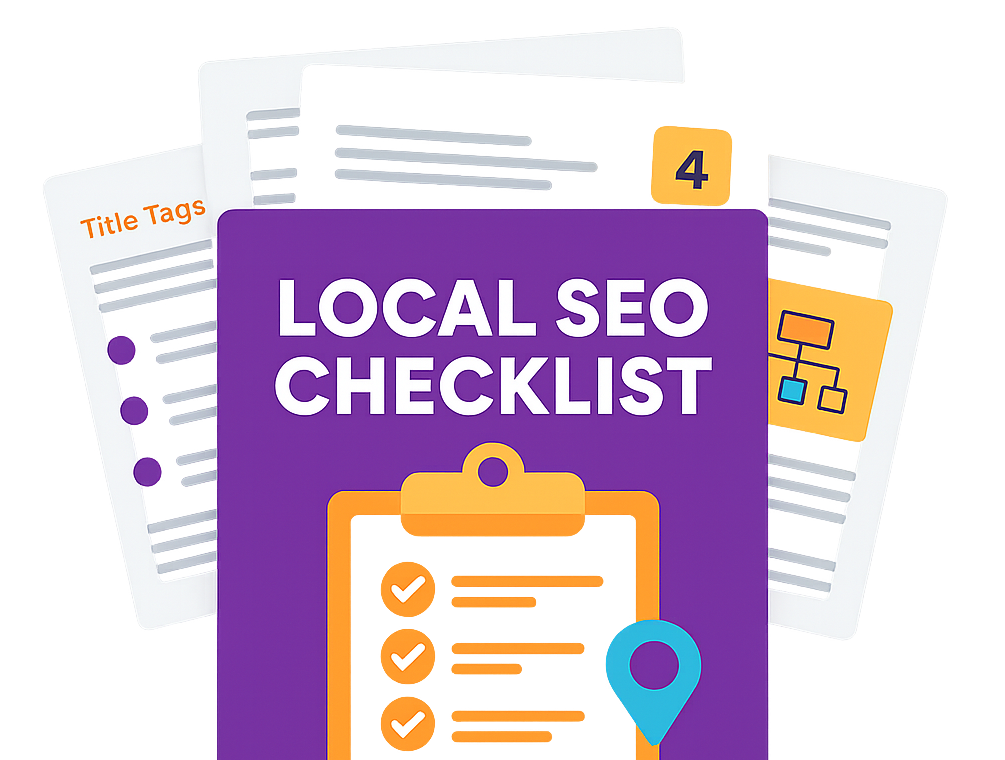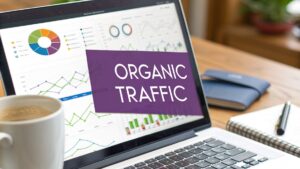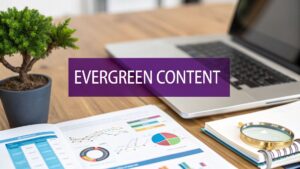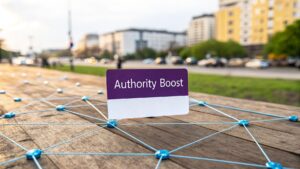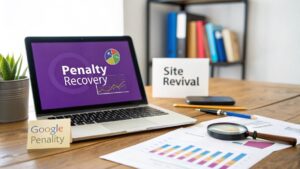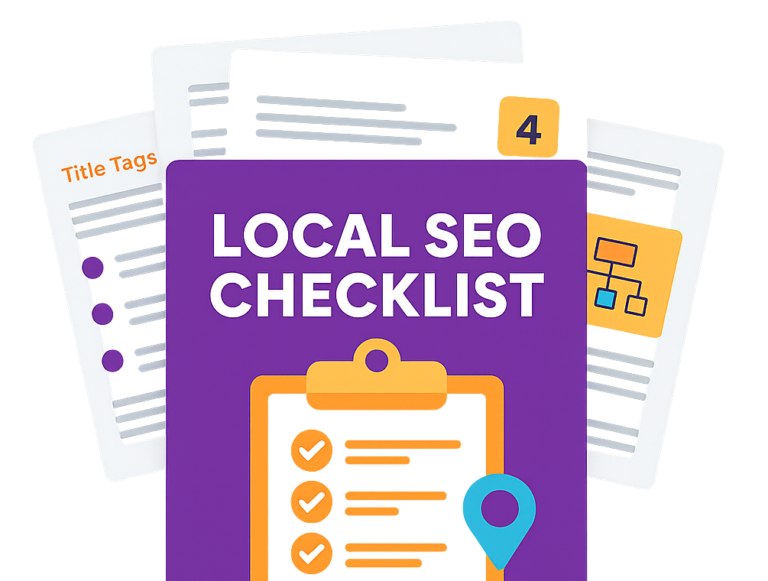Off-page SEO covers everything you do beyond your own website to influence how search engines rank you. It’s all about your site’s reputation—how other sites, platforms and users view your authority and reliability. Think of it as digital word-of-mouth.
Unpacking Off Page SEO And Its Importance
If your website is like a high-street shop, on-page SEO is the careful shelving, crisp product tags and friendly layout you control inside. Off-page SEO, by contrast, is the buzz outside your door: glowing local press mentions, word-of-mouth recommendations and social chatter about your service.
Google and other search engines treat these external endorsements as independent votes of confidence. A quality backlink is like a respected local figure telling customers, “Trust this shop.” That’s why off-page SEO isn’t optional – it’s the other half of the SEO equation.
Building Your Digital Reputation
At its heart, off-page SEO is about growing authority. You demonstrate credibility to the wider web through activities such as:
- Earning Backlinks: Securing links from high-quality, relevant sites
- Brand Mentions: Appearing in blogs, news outlets or niche forums
- Social Signals: Sparking engagement on platforms like Twitter, LinkedIn or Facebook
- Local Citations: Keeping your Name, Address and Phone (NAP) details consistent across directories
These signals help search engines gauge how the public perceives your brand. A well-rounded off-page profile shows you’re a trusted player in your field, boosting your chances of ranking higher. You can explore how this is measured in our comprehensive guide to Domain Authority:
comprehensive guide to Domain Authority
“Off-page SEO is ultimately about proving your value to both users and search engines. It’s the process of building a strong, trustworthy reputation that extends far beyond the boundaries of your own domain.”
The Power Of External Endorsements
External signals carry real weight in Google’s algorithm. In the UK market, for example, pages occupying the top three spots in search results boasted 3.8 times more backlinks than pages further down. That figure underlines just how crucial backlinks are for off-page success.
This proves that what happens off your site can be just as decisive as on-site tweaks. To see these differences at a glance, take a look at the table below.
On Page vs Off Page SEO At A Glance
To help you spot the contrast quickly, here’s a side-by-side comparison of on-page and off-page activities:
| Factor | On Page SEO (Your Website) | Off Page SEO (The Wider Internet) |
|---|---|---|
| Focus | Elements you control directly (content, keywords, site speed). | Building reputation and authority through external signals. |
| Examples | Title tags, meta descriptions, internal linking, mobile speed. | Backlinks, social media shares, brand mentions, online reviews. |
| Goal | Make your site clear, valuable and crawl-friendly. | Show search engines that others find your site valuable and trustworthy. |
This snapshot shows why both on-page clarity and off-page reputation matter for a rounded SEO strategy.
The Core Pillars of Your Off-Page Strategy
Off-page SEO isn't a single task but a collection of different signals that come together to build your website's reputation across the internet. Think of them as the pillars supporting your digital authority. When you strengthen each one, you create a robust foundation that search engines like Google learn to trust.
To get a real feel for what off-page SEO is in practice, it helps to see how its key parts fit together. The infographic below shows how off-page and on-page activities are two distinct but equally vital branches of a complete SEO strategy.
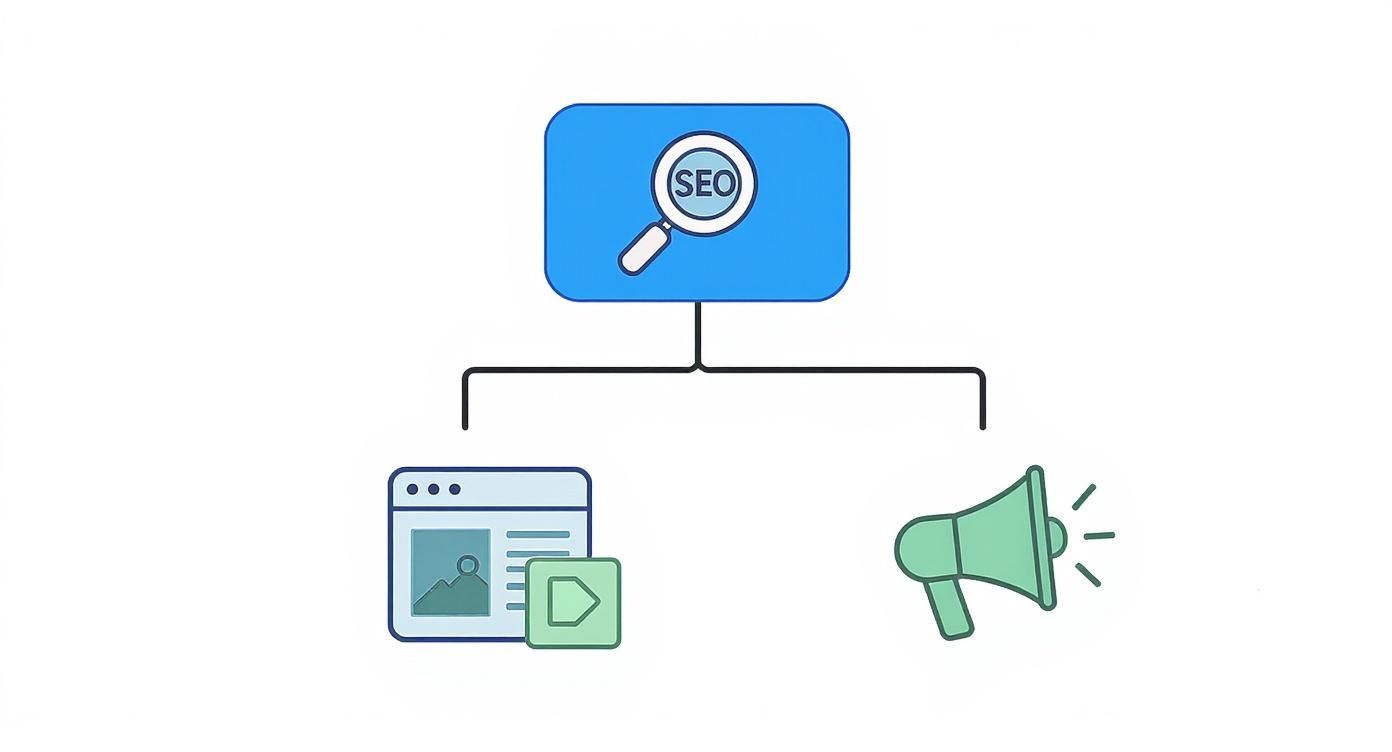
This visual makes it clear: off-page optimisation is like using a megaphone to broadcast your authority outwards, while on-page SEO is all about perfecting your internal structure.
Let's break down the most important pillars you need to build.
Backlinks: The Original Votes of Confidence
Backlinks are simply hyperlinks from other websites to yours, and they remain one of the most powerful signals in the off-page world. In Google's eyes, a link from a reputable, relevant site is a massive endorsement. It’s like a well-respected expert in your field pointing to your business and telling their audience, "This is a company you should trust."
But here's the catch: not all links are created equal. It's all about quality over quantity.
- Authoritative Links: A single link from a major industry publication or a leading university website carries far more weight than dozens of links from unknown blogs.
- Relevant Links: For a local plumber, a link from a Cambridgeshire business directory is more valuable than one from a random international forum. Context matters.
- Natural Links: Links should be earned because your content is brilliant or your reputation is solid, not bought or acquired through spammy schemes.
Building a strong backlink profile tells search engines that your website is a credible and valuable resource, which directly impacts your ability to rank for competitive keywords.
Brand Mentions and Digital PR
What happens when a major news outlet or an influential blogger mentions your brand without actually linking to your website? These are called unlinked brand mentions, and they still count. Google is smart enough to connect these mentions to your brand, seeing them as positive signs of your growing reputation.
Digital Public Relations (PR) is the art of earning these mentions. It involves building genuine relationships with journalists, bloggers, and industry influencers to get your name out there in online publications. Each mention, linked or not, adds to your overall digital footprint and reinforces your brand’s legitimacy.
Local Citations and Google Business Profile
For any UK business serving a local community, this pillar is non-negotiable. Local citations are mentions of your business's Name, Address, and Phone number (NAP) on other websites, like online directories, local business associations, and review platforms. Consistency is everything; your NAP details must be identical wherever they appear.
Your Google Business Profile (GBP) is your single most important local citation. A fully optimised GBP—complete with positive reviews, accurate opening hours, and fresh posts—is your ticket to dominating local search results and the map pack. If you want to dive deeper, our guide on https://www.bare-digital.com/ultimate-guide-to-high-authority-directory-submissions/ is a great place to start.
By meticulously managing your local citations and GBP, you send strong signals to Google that you are a legitimate, active, and trusted local business. This is fundamental for attracting nearby customers.
Social Signals and Online Reviews
While the direct impact of social media shares on rankings is often debated, their indirect influence is undeniable. An active social media presence builds brand awareness, drives traffic to your site, and encourages brand mentions across the web. When people share your content, it gets seen by new audiences, which can lead to more backlinks and brand searches.
Online reviews on platforms like Google, Trustpilot, or industry-specific sites are also a vital off-page signal. They work as social proof, building trust with both potential customers and search engines. While traditional link building is crucial, it's also worth exploring how utilising user-generated content for SEO can contribute to your website's rankings.
The modern search environment looks at a wide array of signals. A recent analysis by UK-based SEO experts shows that approximately 60% of search results now incorporate off-page signals from social media, news outlets, and review sites. This trend highlights Google's sophisticated approach to evaluating a brand's complete digital presence, not just its website.
Actionable Off-Page SEO Strategies for UK Businesses

Knowing the theory is one thing, but getting results comes from putting it into practice. This is where we shift from concepts to a clear playbook of tactics that work for UK businesses. These aren't risky shortcuts; they’re proven strategies designed to build lasting authority online.
The aim is to weave together activities that naturally earn trust and endorsements from all corners of the web. By focusing on creating real value and building relationships, you’ll develop a powerful off-page profile that fuels genuine growth.
Earn Links Through High-Value Guest Blogging
Guest blogging is still a massive part of off-page SEO, but the game has changed. Forget churning out low-quality articles for any website that will take them. Today, it’s all about strategic contributions.
The trick is to find authoritative, UK-based blogs or industry sites that your ideal customers actually read and trust. When you pitch a well-researched article that solves a genuine problem for their audience, you not only establish yourself as an expert but also earn a backlink that carries real weight.
To get this right:
- Find Relevant Targets: Look for non-competing businesses, industry news sites, or popular bloggers in your niche with a solid UK following.
- Analyse Their Content: Get a feel for their tone, audience, and what topics do well before you even think about sending an email.
- Offer Genuine Value: Propose a topic that fills a gap in their content, offering a fresh angle or unique data they don't already have.
- Write an Exceptional Piece: Your guest post should be just as good—if not better—than the content on your own website. This builds your reputation and makes the host eager to feature your work.
Create Genuinely Shareable Content Assets
One of the best ways to attract backlinks is to create something so valuable that other websites can't help but reference it. These "linkable assets" are pieces of content that become the definitive resource on a subject.
Instead of just another blog post, think bigger. Create:
- Original Research or Surveys: Run a survey on a UK-specific industry trend and publish the findings. Journalists and bloggers are always looking for fresh data to cite.
- In-Depth Guides or Tutorials: Build the most comprehensive, helpful guide on a complex topic in your field. Make it the last resource anyone will ever need on that subject.
- Useful Tools or Calculators: A free tool, like a mortgage calculator for a financial advice site, can attract a steady flow of natural links with zero ongoing effort.
These assets take more work upfront, but they can generate passive backlinks for years, becoming a solid foundation for your off-page efforts. For a deeper dive into the mechanics, our guide on https://www.bare-digital.com/how-to-build-backlinks/ offers more detailed techniques.
A single piece of outstanding, data-driven content can earn more high-quality links than a hundred mediocre articles. Focus your resources on creating something truly exceptional that becomes a go-to resource in your industry.
Build Relationships for Digital PR Wins
Digital PR is all about earning media coverage online, which leads to powerful brand mentions and backlinks from news outlets and top-tier publications. At its heart, this is about building real relationships with journalists, bloggers, and influencers in your sector.
Start by following relevant UK journalists on platforms like X (formerly Twitter) and LinkedIn. Genuinely engage with their work and position yourself as a reliable source of information. When you have something genuinely newsworthy to share—like that original research we just talked about—you’ll already have a warm contact to reach out to.
If you need a hand scaling your external link profile, you could look into professional link building services, as they are still a crucial part of off-page SEO, even in the age of AI search. These services can help manage the time-consuming outreach needed for effective digital PR.
Measuring the Real Business Impact of Your Efforts
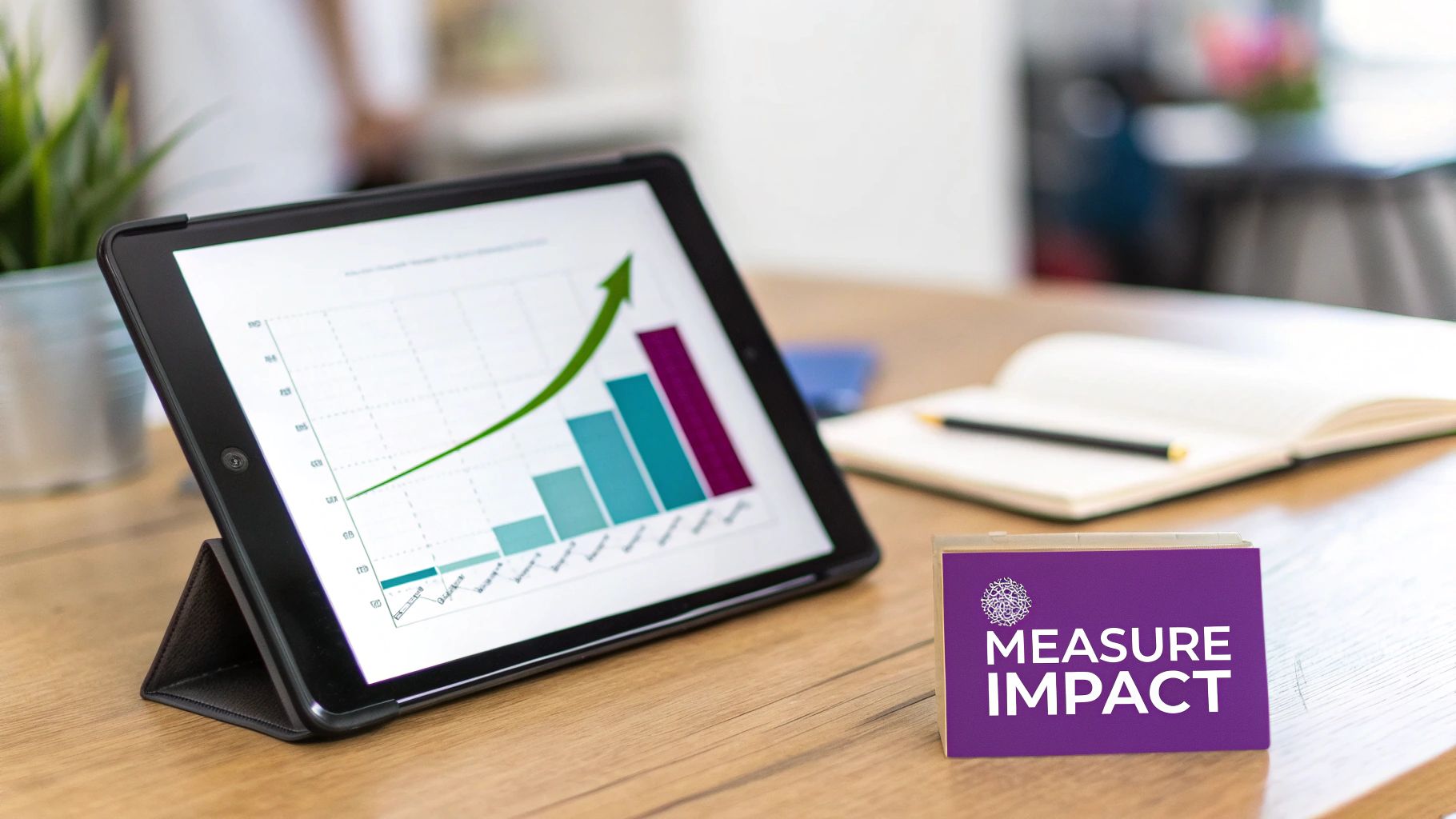
Putting together a smart off-page SEO strategy takes a serious amount of time and effort. But how do you actually know if it's working? Answering that question is what connects all your hard work to real business outcomes, like more revenue and a stronger brand.
Measuring the impact goes way beyond just ticking boxes. It’s about seeing how a stronger online footprint translates into better search rankings, more organic traffic, and greater credibility in your industry. Ultimately, those are the things that lead to what every business wants: more qualified leads and sales. This isn't just a technical task; it's a core marketing function that builds a resilient brand for the long haul.
Key Performance Indicators for Off-Page SEO
To figure out if you're succeeding, you need to track the right numbers. While every campaign has its own unique goals, a few key performance indicators (KPIs) give you a clear picture of how your off-page activities are really doing. Keeping a close eye on these will tell you what’s working and where you might need to change your game plan.
Here are the essential metrics to watch:
- Backlink Profile Growth: Keep an eye on the number of new referring domains pointing to your site. A steady stream of new links from relevant, high-quality sources is the clearest sign of a successful link-building campaign.
- Domain Authority (or Similar Metrics): While it's a third-party metric, tracking scores like Domain Authority (DA) from Moz or Domain Rating (DR) from Ahrefs gives you a good general sense of your site's growing influence over time.
- Search Engine Rankings: Monitor your keyword positions for your most important commercial and informational terms. As your off-page profile gets stronger, you should see your rankings climb for these target phrases.
- Organic Traffic Volume: This is the big one. The whole point of ranking higher is to get more visitors. An upward trend in organic search traffic is one of the most direct signs that your SEO efforts are paying off.
- Referral Traffic: Check how many visitors are clicking through directly from the websites that link to you. This proves your backlinks aren’t just boosting SEO—they're also driving engaged, relevant traffic.
Connecting Metrics to Business Revenue
Seeing these numbers go up is great, but the real test is whether they’re actually impacting your bottom line. This is where you draw a direct line from your off-page SEO work to business results like leads, sales, and return on investment (ROI). For example, a jump in organic traffic should line up with more contact form submissions or online purchases.
UK marketing data shows just how powerful strategic SEO can be. Small and medium-sized businesses in the UK might invest anywhere from £3,000 to £10,000 a month on their campaigns. That investment really pays off, with SEO leads closing at a 14.6% rate—miles ahead of the 1.7% close rate for outbound leads. Put simply, SEO is 8.5 times more likely to convert a potential customer. Some sectors see even better results, with certain e-commerce brands hitting a 317% SEO ROI.
Off-page SEO is more than just a marketing expense; it's a strategic investment that reduces your long-term dependence on paid advertising. By building a strong organic presence, you create a sustainable and cost-effective channel for attracting new customers.
How to Track and Report Your Success
If you can’t track it, you can’t prove its value. Using tools like Google Analytics 4 and Google Search Console is non-negotiable for monitoring traffic, conversions, and keyword performance. For a deeper dive into your backlink profile, platforms like Ahrefs or Semrush are indispensable.
Pulling all this data together in a way that makes sense is crucial for showing your value. Below is a quick look at the key metrics you should be tracking and the tools that can help.
Key Off Page SEO Metrics to Track
| Metric | What It Measures | Why It's Important | Example Tool |
|---|---|---|---|
| Referring Domains | The total number of unique websites linking to yours. | Shows the breadth of your backlink profile and growing authority. | Ahrefs, Semrush |
| Domain Authority/Rating | A score predicting a website's ability to rank in search results. | Provides a high-level benchmark of your site's influence over time. | Moz, Ahrefs |
| Keyword Rankings | Your position in search results for specific target keywords. | Directly measures visibility for terms that drive business. | Semrush, SE Ranking |
| Organic Traffic | The number of visitors arriving from unpaid search results. | The ultimate indicator of SEO success, leading directly to leads and sales. | Google Analytics 4 |
| Referral Traffic | Visitors who arrive on your site by clicking a link on another website. | Shows that your backlinks are driving actual, engaged users. | Google Analytics 4 |
| Conversion Rate | The percentage of organic visitors who complete a desired action. | Connects SEO traffic directly to tangible business outcomes like sales or leads. | Google Analytics 4 |
Regular reports help you and any stakeholders understand the progress you're making. If you need a good starting point, our guide on creating a https://www.bare-digital.com/monthly-seo-report-template/ can give you a solid framework. This ensures everyone sees the direct business impact of your off-page optimisation.
Common Off Page SEO Mistakes to Avoid
Building a strong online reputation takes a lot of time and dedication, but just a few wrong moves can unravel all that hard work in a flash. When you're dealing with off-page SEO, you have to steer clear of tempting shortcuts and old-school tactics that Google now actively penalises.
Knowing the common pitfalls is your first line of defence. This is about creating a resilient digital presence and making sure your efforts lead to long-term growth, not short-term headaches.
Purchasing Low-Quality Backlinks
The promise of a quick win is tempting, which is why so many people get lured into buying backlinks. This is, without a doubt, one of the riskiest things you can do for your website. Search engines are incredibly sophisticated at spotting the unnatural link patterns that come from link farms or private blog networks (PBNs).
These networks are just collections of rubbish sites built for the sole purpose of selling links. They offer zero real value to anyone, and a link from one is a massive red flag to Google.
Buying links is like building a house on a foundation of sand. It might stand up for a minute, but it’s guaranteed to collapse. The worst-case scenario? A manual penalty from Google that could completely wipe you out of the search results.
Instead of buying links, focus on earning them. Create great content, build real relationships, and do genuine outreach. That's how you build a solid, trustworthy backlink profile that search engines will reward.
Over-Optimising Anchor Text
Anchor text—the clickable words in a link—helps Google figure out what a page is about. But go too far, and it will backfire spectacularly. If every single link pointing to your "Cambridgeshire plumbing services" page uses that exact phrase, it looks completely unnatural.
A healthy backlink profile has a nice, varied mix of anchor text.
- Branded Anchors: Using your company name, like "Bare Digital".
- Naked URLs: The web address itself, like "https://www.bare-digital.com".
- Generic Anchors: Vague phrases like "click here" or "read more".
- Topic-Related Anchors: Words related to your keyword, like "local SEO experts".
When your anchor text is over-optimised, it screams "I'm trying to game the system!" Aim for a natural, balanced distribution to keep your profile looking clean and avoid penalties.
Ignoring Link Relevance and Quality
Let's get one thing straight: not all backlinks are created equal. A classic mistake is chasing quantity over quality, getting excited about every new link without even looking at where it came from. A single backlink from a respected, relevant website in your industry is worth a hundred links from random, low-authority blogs.
Before you go after a link, always ask yourself these questions:
- Is this website actually relevant to my industry or local area?
- Does this site have a real, engaged audience?
- Is the website trustworthy and well looked after?
Focus your energy on getting links from reputable sources. It’s about building a network of endorsements that make sense and reinforce your credibility in your field. This is the cornerstone of a successful off-page SEO strategy.
Answering Your Off-Page SEO Questions
As you start to get your head around off-page SEO, it’s only natural for more questions to pop up. This is where we tackle the common queries we hear all the time, giving you straight, practical answers to help you go from understanding the idea to actually applying it with confidence.
How Long Does It Take to See Results from Off-Page SEO?
Think of off-page SEO as a long-term investment in your brand’s reputation, not a quick fix. Unlike on-page tweaks that Google can spot and index fairly quickly, building real authority through outside signals takes a lot of patience and consistency.
Generally, you can expect to see the first signs of positive movement in your search rankings within 3 to 6 months of steady, high-quality work. This might look like a slow climb up the keyword rankings or a small but noticeable bump in your domain authority score.
However, for the big, lasting results—like grabbing top spots for competitive keywords and seeing a proper jump in organic traffic—it often takes 6 to 12 months or even longer. The exact timeline really depends on a few key things:
- Your Industry: A local bakery will see results much faster than a national insurance firm. The competition level is night and day.
- Your Starting Point: A brand-new website has a much longer road ahead than an established site with some authority already baked in.
- Quality of Your Efforts: Earning a single link from a major industry publication is worth more than dozens of links from low-quality directories.
- Consistency: A steady, ongoing strategy will always beat sporadic bursts of activity.
The key is to see it as a marathon, not a sprint. Focus on slow and steady growth rather than chasing overnight wins that rarely last.
Which Is More Important: On-Page SEO or Off-Page SEO?
This is a classic question, but it’s a bit of a false choice. It's like asking whether a car's engine or its wheels are more important—you need both to get anywhere. On-page and off-page SEO are two sides of the same coin; one simply can't work properly without the other.
Think of it this way: On-page SEO is your foundation. It’s making sure your house is built well, with clear signs, solid wiring, and great stuff in every room. Without this, inviting people over (off-page SEO) would be a total waste of time.
On the flip side, off-page SEO is what builds your reputation in the neighbourhood. It’s the positive word-of-mouth, the glowing reviews, and the recommendations from others that tell people your well-built house is absolutely worth visiting. A perfectly optimised site with no external signals of trust will just sit there, unseen.
A balanced strategy that gives proper attention to both is the only way to get the best possible search rankings. The right way to do it is to build a solid on-page foundation first, then amplify its reach and authority with a strong off-page strategy.
Can I Do Off-Page SEO Myself for My Small Business?
Yes, you absolutely can. While big, complex campaigns often need specialist help, many of the most important off-page SEO tasks are perfectly manageable for small business owners. You can make a real difference by focusing on a few high-value, achievable jobs.
Here are a few things you can get started with right away:
- Claim and Polish Your Google Business Profile: This is your most powerful tool for local SEO. Fill it out completely, add good photos, and gently encourage your customers to leave reviews.
- Build Local Citations: Get your business listed correctly and consistently in key UK directories like Yell, Thomson Local, and other business hubs relevant to your area.
- Encourage Customer Reviews: Don't be shy—actively ask your happy customers to leave feedback on Google, Trustpilot, or any industry-specific review sites. Positive reviews are a massive trust signal.
- Get Involved Locally: Sponsoring a local kids' football team or partnering with a nearby, non-competing business can earn you some fantastic local links and mentions.
- Start Building Relationships: Begin connecting with local bloggers or industry writers. You don't have to ask for a link straight away; just build a rapport. This can lead to guest posts or media mentions down the line.
These in-house efforts can lay a brilliant foundation for your website's authority.
What Is the Difference Between Link Building and Off-Page SEO?
This is a really important distinction to grasp. Link building is a huge part of off-page SEO, but it isn't the whole story. The easiest way to think about it is as a category and a sub-category.
Off-page SEO is the umbrella term. It covers all the actions you take outside of your own website to boost its reputation and search engine rankings. It’s a broad category that includes a whole range of signals that build trust and authority.
Link building, on the other hand, is just one specific activity that sits under that umbrella. It refers purely to the process of getting hyperlinks from other websites to point to your own.
To make it crystal clear, here’s a simple breakdown:
| Off-Page SEO (The Main Category) | Link Building (A Sub-Category) |
|---|---|
| Includes all external trust signals. | Focuses only on getting hyperlinks. |
| Covers unlinked brand mentions. | Cares mainly about linked mentions. |
| Involves social media and reviews. | Aims to increase referring domains. |
| Includes local citations (NAP). | Aims to improve backlink profile quality. |
While getting good links is often the most powerful part of an off-page strategy, a truly great approach looks beyond just links to build a well-rounded, trustworthy brand presence online.
At Bare Digital, we specialise in creating bespoke off-page SEO strategies that build genuine authority and drive measurable growth for UK businesses. If you're ready to see how a professional campaign can elevate your brand, get in touch for your free, no-obligation SEO Health Check today.


